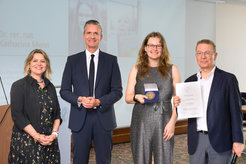Otto Hahn Medal for Katharina Menn & Malte Brammerloh
At the annual meeting of the MPG on 25 June 2025, the Otto Hahn Medal was awarded 28 times for outstanding scientific achievements in connection with doctoral theses. This year, Katharina Menn from the Department of Neuropsychology and Malte Brammerloh from the Department of Neurophysics at the Max Planck Institute for Human Cognitive and Brain Sciences (MPI CBS) received two of the coveted awards. Here they answer three questions about their research in a short interview.

Your dissertation has just been honoured with the Otto Hahn Medal. What makes your work so special?
Katharina Menn:
In my dissertation, I investigated how language and the brain influence each other in early childhood. The fascinating thing about it is: In the first few years of life, the child's brain is still developing very strongly and children acquire their mother tongue at the same time.
I was able to show that language acquisition in early childhood is shaped by brain development. What the child learns depends on what the brain can process particularly well at that moment. What was also particularly exciting was that parents also adapt their speech to the developmental stage of the child's brain: they speak in such a way that the child's brain can optimally process the parental speech.
We have analysed this close coordination between brain maturation, language acquisition and parental interaction using EEG data and natural language environments. The work thus contributes to a better understanding of the neurobiological basis of language acquisition and to understanding why language ‘just happens’ so well, even though it is actually extremely complex.

Malte Brammerloh:
In my doctoral thesis, I investigated how iron-rich nerve cells can be visualised using magnetic resonance imaging (MRI). These cells die off over a large area in Parkinson's disease. If their loss could be recognised in the living brain, an earlier diagnosis would be possible.
My work is characterised above all by its interdisciplinary nature and its potential social implications. I used a wide range of methods for my dissertation: I linked high-field MRI images at the MPI for Human Cognitive and Brain Sciences (MPI CBS) with invasive iron measurements in post-mortem tissue, including at the German Electron Synchrotron. I also used new histological methods and biophysical modelling in collaboration with various national and international partners.
This multidisciplinary approach gave me a unique perspective. For example, I developed an MRI-based single-cell magnetometry method that helps in the study of cellular iron biology. In addition, I was able to correct the common interpretation of a Parkinson's biomarker in clinical radiology. Last but not least, the results of my work could lay the foundation for an earlier diagnosis of Parkinson's disease - which in turn would open up new treatment options and benefit millions of sufferers and their families worldwide.
What is your motivation for working on this topic?
Katharina Menn:
I am fascinated by how children manage to learn language without anyone consciously teaching them rules. Language is one of the most central human abilities and yet children learn their mother tongue quite naturally, seemingly just by listening and interacting.This apparent paradox - a highly complex skill that is acquired effortlessly - was the starting point for me. I wanted to understand how the brain makes this acquisition possible in the first place. I believe that we can better understand the phenomenon of human language if we understand how children learn language.
Malte Brammerloh:
I studied physics, specialising in theoretical physics, but I really wanted to choose a PhD topic whose results could also be applied in practice. This resulted in an exciting balancing act: on the one hand, I am investigating the iron-based MRI contrast in the brain on a theoretical level, while on the other, this research could help to diagnose Parkinson's earlier. I could hardly combine my two interests - the love of theory and the desire for concrete benefits - any better.
The award-winning dissertation is in the bag. What's next?
Katharina Menn:
Since the end of last year, I have been working as an assistant professor at Tilburg University in the Netherlands. There I am continuing my research into the interplay between brain and language development, both in children with typical language acquisition and in children who find it difficult to acquire language. I am very grateful that I was given the opportunity to take up a permanent position so soon after completing my doctorate, which opens up long-term prospects for me in research. And personally, I am looking forward to another exciting chapter: I will be a mother myself in the autumn and am looking forward to experiencing language acquisition from a completely new perspective.
Malte Brammerloh:
I am currently working as a postdoctoral researcher at the University Hospital in Lausanne (Switzerland). There I am continuing my research into transforming MRI into a kind of ‘microscope’ that can provide cellular information in living humans. Specifically, I am modelling an additional MRI contrast, namely diffusion-weighted MRI, which provides additional data to the iron contrast. I am also analysing the MRI signal of certain metabolic molecules in the brain to learn more about the spatial structure of different cell populations. I hope that this work will contribute to a more comprehensive tissue characterisation and ultimately lead to clinically relevant developments.













